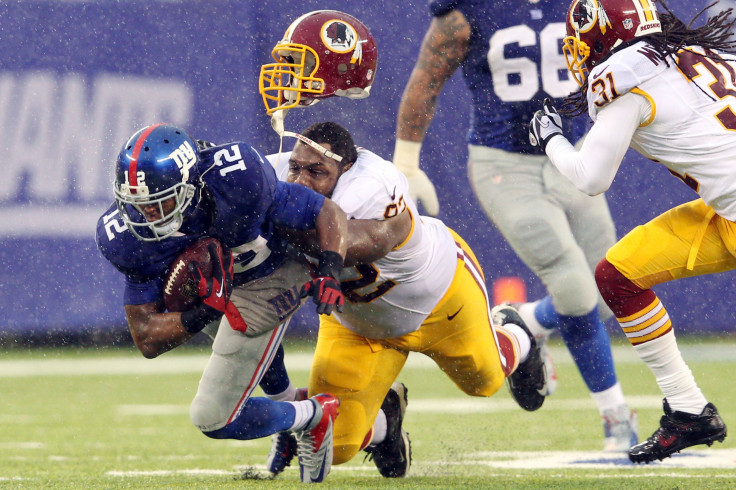Redskins Name Trademark Canceled: The Whole NFL Could Lose Millions

With six of its trademarks no longer protected, the value of Dan Snyder’s Washington Redskins franchise could take a significant financial hit. The U.S. Patent and Trademark office ruled to cancel six trademarks belonging to the Redskins football team, which includes stylized versions of the name and logo, after deeming the registrations were “disparaging to Native Americans.”
While Snyder has shouldered the social consequences of keeping the Redskins name, the trademark changes announced by the Patent and Trademark Office have implications for most of the league. Without legal trademark protections, a portion of the National Football League’s estimated $9 billion of merchandise revenue is in jeopardy for not only Snyder, but the rest of the league. Thirty-one of the NFL’s teams (the lone holdout being the Dallas Cowboys), have entered into a revenue-sharing agreement when it comes to licensed merchandise, meaning they pool and split all the revenue made from all licensed products. A smaller-market team's merchandise sales have lesser effect on a $9 billion pie -- but the Redskins are no small market team.
According to Forbes NFL valuations, the Redskins are the third most valuable franchise in the league, worth $1.7 billion, after the Dallas Cowboys and the New England Patriots. Contributing to this value is $145 million worth of brand revenue. So it’s clear that changes in the Redskins trademarks could potentially have a profound effect not only on the Washington franchise but also others.
“Indeed there would be a loss of value,” Mark Conrad, director of the sports business specialization at Fordham University’s Gabelli School of Business and associate professor of law and ethics at the university, said via telephone. “In theory, the exclusivity would be affected, and there could be hundreds of places using that name, mark and design and they would lose value in exclusiveness for the team and the NFL.”
Marc Edelman, law professor at the Baruch College’s Zicklin School of Business and sports business scholar, said in a phone interview: “[The team] will face increasing challenges moving forward in preventing others outside the United States from making merchandise bearing their team name and logos, and as a result may face a more difficult time licensing the rights to use their name and logos to third parties, such as apparel manufacturers.
“Even if apparel manufacturers are indifferent to the social issues related to the use of Washington D.C.’s football team’s name, they may still be reluctant to pay the same amount to license the rights to uses logos out of fear that it would be more difficult to enjoin unlicensed third parties from also using those marks in a competing way.”
Snyder and the Redskins have made it clear that they have no intention of changing the name despite pressure not only from Native American rights groups but also the media and even Congress. Aside from Snyder's arguments of tradition and nostalgia, another reason could be money.
The cost of rebranding a franchise could be “millions,” Conrad, the associate professor of law and ethics at Fordham, said. Michael Jordan, legendary basketball player and owner of the Charlotte Bobcats, told a blogger for the Charlotte Observer that it would cost anywhere from $3 million to $10 million to change the unpopular name of North Carolina’s NBA team. For the much-bigger Redskins, it would likely cost more than that.
A source with knowledge of financial operations in professional football told Sports on Earth, a blog curated by various sports writers, that the costs for a “significant NFL team” could be anywhere from “$10 million to $20 million.”
The Redskins camp announced that a name change is still not an option, confirming that the team will be appealing the Patent and Trademark Office’s decision. The appeals process will undoubtedly be a lengthy procedure, but the precedent may have already been set. Other professional sports teams that feature Native American mascots and logos could be targeted next. “It’s quite possible this sets a precedent,” Conrad said. “But groups need to sue claiming disparagement.”
Conrad noted that the Cleveland Indians’ controversial cartoonish Chief Wahoo logo could be the next target of the U.S. Patent and Trademark Office.
© Copyright IBTimes 2024. All rights reserved.












